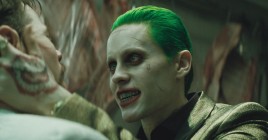Somewhere along the way, Hollywood decided that villainy is synonymous with camp. Evil, in its most uninspired cinematic forms, gets coated in showy extravagance. While a little outsize depravity can be fun, this weekend’s “Suicide Squad” proves we have hit a plateau where bigger is almost certainly not better. Of course, I am referring primarily to Jared Leto, he of the insufferable rat-gifting, always-in-character method acting that led to an obnoxiously calculated take on the psychopathic Joker. Leto is proud of his performance ― the self-inflation radiates off of him every time he’s onscreen, which is far less frequent than one would assume, given how extensively he has teased this role for the better part of the past year. (Good move, Warner Bros.) Leto said he prepped for the project by watching footage of violent crimes on YouTube, but his works seems more like a the result of a checklist than a study in delinquency. His mantra must have been, “Wide eyes, empty hearts, can’t lose.” That slow, maniacal laugh? “All the best villains have one,” he probably said, practicing over and over in the mirror. And when it’s time to speak, oh, a guttural garble will do. “Here I am, boys, call me Mr. J!” (No, really. He made people on the set call him Mr. J.) Leto cranks up everything he does in “Suicide Squad” to an 11. Surely, to some degree, despite the praise he’s doled out in interviews, Leto thinks he is one-upping Heath Ledger’s full-bodied “Dark Knight” performance and Jack Nicholson’s batty “Batman” turn. But he lacks their brooding complexity. The Joker of “The Dark Knight” was a terrorist with a cause, whereas the Joker of “Suicide Squad” is merely a joke. And an uninteresting one, at that.










